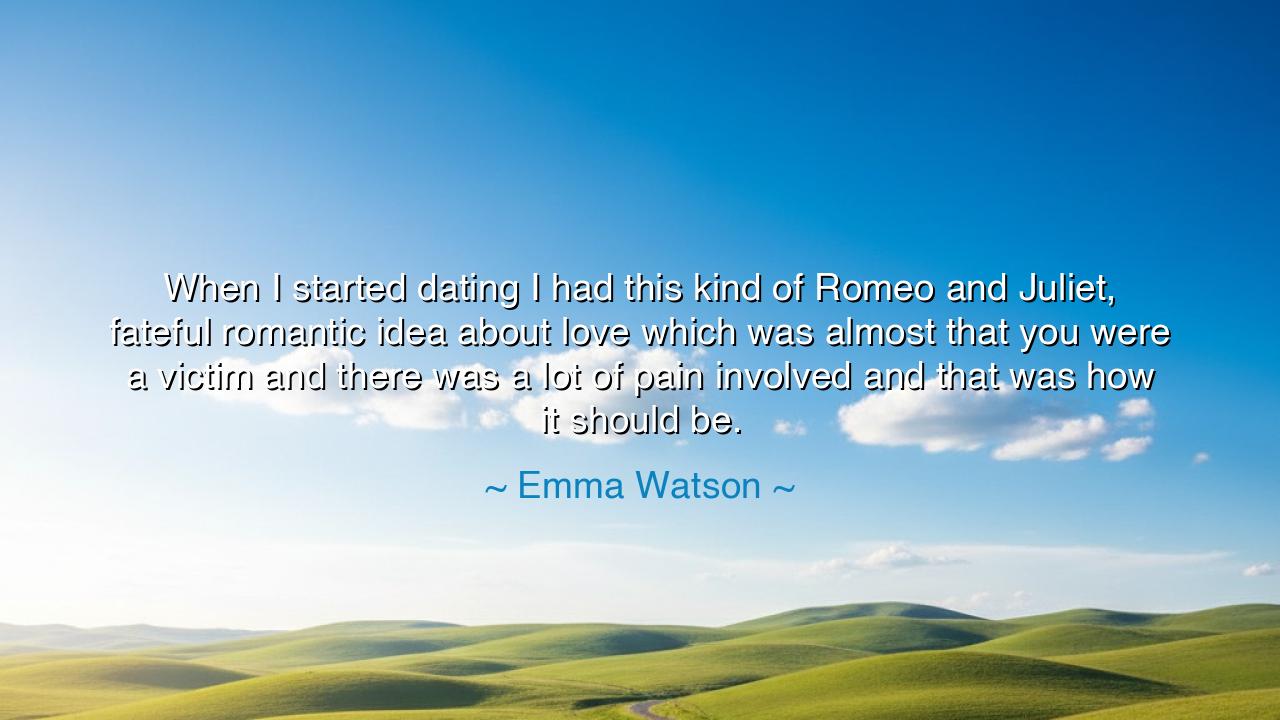
When I started dating I had this kind of Romeo and Juliet
When I started dating I had this kind of Romeo and Juliet, fateful romantic idea about love which was almost that you were a victim and there was a lot of pain involved and that was how it should be.






In the words of Emma Watson, “When I started dating I had this kind of Romeo and Juliet, fateful romantic idea about love which was almost that you were a victim and there was a lot of pain involved and that was how it should be.” — we find the awakening of a heart once entranced by illusion, now illuminated by understanding. Her words speak not only for herself, but for countless souls across the ages who have mistaken suffering for love, and tragedy for passion. Beneath her gentle confession lies an ancient truth: that true love is not found in the drama of destruction, but in the quiet courage of mutual respect, growth, and peace.
The origin of this reflection lies in the cultural myth that has haunted humanity since the days of bards and poets — the myth of romantic fatalism. From Shakespeare’s Romeo and Juliet to the tales of doomed lovers in every age, the world has glorified love as something entwined with sorrow and sacrifice. In youth, the heart is easily enchanted by such stories — the vision of lovers so consumed by emotion that they would die rather than live apart. To the untested soul, this seems noble, even divine. But as Emma Watson discovered, the reality of love is far quieter, deeper, and more demanding. It asks not for the burning of life, but for the tending of it — not for martyrdom, but for maturity.
The ancients knew this dual nature of love well. The Greeks spoke of Eros, the consuming fire of passion, and Agape, the enduring love that grows from devotion and understanding. Eros, though beautiful, was dangerous — the same force that drew Helen and Paris into ruin, that led kings to war and kingdoms to ashes. Agape, by contrast, was love made wise — the flame that warms without burning, that sustains life rather than consumes it. In her words, Emma Watson moves from one to the other — from the Eros of fantasy to the Agape of reality. She speaks as one who has walked through illusion and emerged with clearer sight.
Consider the story of Cleopatra and Mark Antony, two lovers whose passion blazed brighter than the sun, yet destroyed them both. They lived as though love were a storm to be survived rather than a garden to be tended. Their devotion, bound to pride and power, ended in tragedy — not because they loved too little, but because they mistook drama for destiny. The ancients saw in their fall a warning: that love without wisdom becomes chaos, and the heart that worships pain soon learns despair. Emma Watson’s realization mirrors this ancient lesson — that love should not make us victims, but partners; not prisoners of feeling, but builders of something enduring.
Her reflection also unveils a deeper human truth: that we often seek in love a reflection of our own longing for meaning. The young heart, in its innocence, confuses intensity with depth, chaos with connection. It believes that love must wound in order to be real — that the ache of jealousy, the tears of heartbreak, the dizzying highs and lows are proof of passion. But the wise know otherwise. Love that is mature does not destroy — it heals. It steadies the soul, teaches patience, and reveals strength in tenderness. The truest love, as the ancients said, is not the fire that consumes, but the light that endures.
Emma’s transformation — from idealizing suffering to seeking balance — reflects a journey all must take. It is the passage from romantic innocence to emotional wisdom, from seeking rescue to standing whole. When she speaks of her younger self’s belief in “fateful romantic love,” she speaks of a world that still glorifies that very myth — where movies, songs, and stories teach us to chase intensity over peace, passion over partnership. Yet, in realizing the folly of that belief, she joins the lineage of the wise — those who understand that the greatest act of love is not dying for another, but living beside them in truth.
Let her words, then, be a lantern for those who still wander in the fog of false romance. Do not mistake pain for passion, nor chaos for closeness. Seek the kind of love that allows you to grow, not disappear; that challenges you, but does not break you. The ancients taught that every great bond must begin with self-knowledge — for only the whole heart can love wholly. Before seeking another to complete you, complete yourself; before losing yourself in love, find yourself within it.
For as Emma Watson reminds us, love need not be a tragedy to be profound. It need not make martyrs to make meaning. The heart that learns this truth will no longer crave the fire that burns, but the warmth that sustains. Let this be the wisdom passed to future generations: that the highest form of love is not fateful but faithful — not the desperate embrace of two who would die for each other, but the steady hand of two who choose, each day, to live together in peace.






AAdministratorAdministrator
Welcome, honored guests. Please leave a comment, we will respond soon